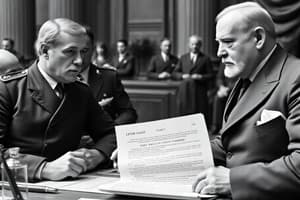Podcast
Questions and Answers
What territories did Germany lose to France as a result of the Treaty of Versailles?
What territories did Germany lose to France as a result of the Treaty of Versailles?
Germany lost Alsace-Lorraine to France.
What was the status of Danzig according to the Treaty of Versailles?
What was the status of Danzig according to the Treaty of Versailles?
Danzig was to be a free city under League of Nations administration.
How many troops was Germany allowed to maintain under the Treaty of Versailles?
How many troops was Germany allowed to maintain under the Treaty of Versailles?
Germany was limited to a maximum of 100,000 troops.
What was the purpose of the War Guilt clause in the Treaty of Versailles?
What was the purpose of the War Guilt clause in the Treaty of Versailles?
What were the reparations that Germany was required to pay, as determined later?
What were the reparations that Germany was required to pay, as determined later?
Which areas were demilitarized according to the Treaty of Versailles?
Which areas were demilitarized according to the Treaty of Versailles?
What argument supports the justification of Germany's objections to the treaty?
What argument supports the justification of Germany's objections to the treaty?
What was the significance of the signing ceremony of the Treaty of Versailles?
What was the significance of the signing ceremony of the Treaty of Versailles?
What principle regarding national self-determination was emphasized by the Allies during the peace conference?
What principle regarding national self-determination was emphasized by the Allies during the peace conference?
How many Germans were left under Polish rule following the peace settlement?
How many Germans were left under Polish rule following the peace settlement?
What was specifically forbidden regarding the unification of Germany and Austria?
What was specifically forbidden regarding the unification of Germany and Austria?
Which African colony was taken over by Britain as part of the mandate system?
Which African colony was taken over by Britain as part of the mandate system?
Why did the Germans resent the disarmament clauses imposed on them?
Why did the Germans resent the disarmament clauses imposed on them?
What was the fate of the territories controlled by the newly established state of Czechoslovakia?
What was the fate of the territories controlled by the newly established state of Czechoslovakia?
What justification did Germans have regarding the loss of their colonies?
What justification did Germans have regarding the loss of their colonies?
How many Germans lived in Austria, and what did they want regarding their national affiliation?
How many Germans lived in Austria, and what did they want regarding their national affiliation?
Why were the Germans not allowed to participate in the discussions at Versailles?
Why were the Germans not allowed to participate in the discussions at Versailles?
What was one significant criticism that the Germans were allowed to raise regarding the Treaty of Versailles?
What was one significant criticism that the Germans were allowed to raise regarding the Treaty of Versailles?
How did Wilson's 14 Points influence the terms of the treaty, according to the Germans?
How did Wilson's 14 Points influence the terms of the treaty, according to the Germans?
What actions by Germany during the war contributed to the harsher Allied attitude towards them?
What actions by Germany during the war contributed to the harsher Allied attitude towards them?
What territory loss did Germany experience due to the Treaty of Versailles?
What territory loss did Germany experience due to the Treaty of Versailles?
What concession regarding Upper Silesia was made to Germany after their criticism?
What concession regarding Upper Silesia was made to Germany after their criticism?
What was the German argument regarding the moral binding of the peace treaty?
What was the German argument regarding the moral binding of the peace treaty?
What was one of the additional points Wilson added after the war regarding Germany's consequences?
What was one of the additional points Wilson added after the war regarding Germany's consequences?
What significant territorial change occurred in 1920 involving Russian territory?
What significant territorial change occurred in 1920 involving Russian territory?
What was the main objective of the Allies regarding Germany's military after World War I?
What was the main objective of the Allies regarding Germany's military after World War I?
What was outlined in Article 231 of the Versailles Treaty?
What was outlined in Article 231 of the Versailles Treaty?
How much in reparations was initially demanded from Germany by the Allies?
How much in reparations was initially demanded from Germany by the Allies?
Who advised the British delegation to propose a lower reparations amount, and what was that amount?
Who advised the British delegation to propose a lower reparations amount, and what was that amount?
What was the consequence of Germany's inability to meet reparations payments?
What was the consequence of Germany's inability to meet reparations payments?
What was the outcome of the reparations situation proposed by the Young Plan in 1929?
What was the outcome of the reparations situation proposed by the Young Plan in 1929?
Why did historians view the reparations decision as problematic?
Why did historians view the reparations decision as problematic?
What were the main economic problems faced by Austria after the treaties?
What were the main economic problems faced by Austria after the treaties?
How did the territorial losses affect Hungary's economy?
How did the territorial losses affect Hungary's economy?
What role did trading tariffs, imposed by new states, play in Austria's recovery?
What role did trading tariffs, imposed by new states, play in Austria's recovery?
What were the consequences of the Treaty of Sevres for Turkey?
What were the consequences of the Treaty of Sevres for Turkey?
How did the Treaty of Lausanne alter the outcomes of the Treaty of Sevres?
How did the Treaty of Lausanne alter the outcomes of the Treaty of Sevres?
What feelings did the Arabs have regarding the mandates established post-World War I?
What feelings did the Arabs have regarding the mandates established post-World War I?
What was the significance of Smyrna in the context of Turkish national sentiment?
What was the significance of Smyrna in the context of Turkish national sentiment?
In what way did the League of Nations impact Austria financially?
In what way did the League of Nations impact Austria financially?
Flashcards are hidden until you start studying
Study Notes
Treaty of Versailles - Terms
- Germany lost territories to France, Belgium, Denmark, Poland, and Lithuania after World War I.
- Alsace-Lorraine was ceded to France.
- Eupen, Moresnet, and Malmedy went to Belgium.
- North Schleswig was given to Denmark after a plebiscite.
- West Prussia and Posen were transferred to Poland, but Danzig, the main port of West Prussia, became a free city under the League of Nations due to its German population.
- Memel was given to Lithuania.
- Germany lost its African colonies, which were placed under League of Nations mandates.
- Germany's military was limited to 100,000 troops with no conscription, tanks, armored cars, military aircraft, submarines, and only six battleships.
- The Rhineland was demilitarized, meaning German troops were barred from the left bank of the Rhine and a 50-kilometer strip on the right bank, occupied by Allied forces for at least ten years.
- The War Guilt Clause blamed Germany for the war, proposing that the former Kaiser be put on trial for war crimes.
- Germany was obligated to pay reparations for damages inflicted on the Allies.
- The League of Nations, established by the treaty, aimed to prevent future wars and promote international cooperation.
German Objections to the Treaty
- The treaty was perceived as a "dictated peace" because Germany was not allowed to participate in the discussions at Versailles.
- Some historians argue that allowing Germany to participate in the discussions might have resulted in less harsh terms and avoided justification for the treaty's violation.
- Germany argued the treaty violated the terms of Wilson's 14 Points. While valid, the 14 Points were never officially accepted by all involved states.
- The Germans, having ignored the 14 Points in January 1918, had to accept the added points regarding reparations for civilian damages and German disarmament after facing defeat.
- The loss of territories, particularly Alsace-Lorraine and West Prussia, was seen as detrimental. However, these losses were mentioned in the 14 Points.
- Germany's lack of representation of its own population's self-determination was unjust - leaving millions of Germans under Polish rule.
- The loss of Germany's African Colonies, which was not a direct consequence of the "impartial adjustment" of the 14 Point terms.
- Germany's disarmament was deeply resented, as they argued 100,000 troops were insufficient for internal security during political unrest.
- The War Guilt Clause, attributing sole responsibility for the war to Germany, was heavily disputed. While later evidence suggests German culpability, it was hardly possible to conclude this in merely six weeks during the peace conference. It was imposed to hold Germany accountable for reparations.
- The reparations demanded of Germany were seen as excessive and humiliating. The initial amount was £6,600 million.
- The unrealistic reparations amount led to Germany defaulting on payments, resulting in resentment among the Allies, who relied on German funds to settle their own war debts.
- The treaty led to significant economic difficulties for Austria and Hungary, both stripped of territory and resources, facing severe economic crises exacerbated by newly established tariffs hindering trade.
Treaty of Sevres - Turkey
- Turkey was forced to cede Eastern Thrace, several Aegean islands, and Smyrna to Greece.
- Adalia and Rhodes were surrendered to Italy.
- The Straits were declared permanently open.
- Syria became a French mandate, while Palestine, Iraq, and Transjordan became British mandates.
- The loss of territory, particularly Smyrna, sparked outrage among the Turkish population who rejected the treaty, forcing the Greeks to withdraw.
- The Italians and French withdrew their forces from the Straits, leaving only British troops.
- The Treaty of Lausanne (1923) revised the Treaty of Sevres, returning Eastern Thrace and Smyrna to Turkey.
- It highlighted the issue of self-determination for the Arabs in the mandates, who were promised independence after their rebellion against the Ottoman Empire and felt betrayed by the establishment of a Jewish "national home".
Studying That Suits You
Use AI to generate personalized quizzes and flashcards to suit your learning preferences.




